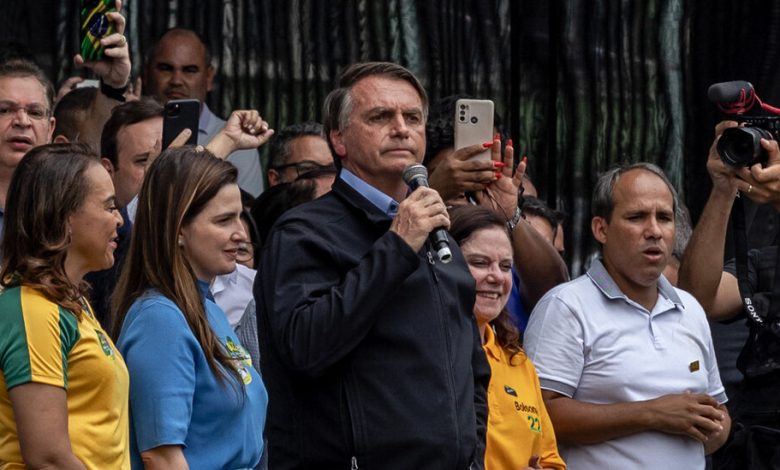Bolsonaro Faces Investigation for Inspiring Brazil’s Capital Riot

Brazil’s Supreme Court said it would investigate former president Jair Bolsonaro for inspiring the far-right mob that invaded and ransacked the country’s Congress, Supreme Court and presidential offices this week, a swift escalation in the probe that shows the former leader could soon face legal consequences for an extremist movement that he helped build.
In a decision late Friday, Alexandre de Moraes, a Supreme Court justice, approved a request from federal prosecutors to include Mr. Bolsonaro in a rapidly expanding investigation into the anti-democratic riots on Jan. 8.
Mr. Moraes, who has emerged as one of the nation’s most powerful — and controversial — figures in recent months, said that Mr. Bolsonaro’s past questioning of Brazil’s election systems and his attacks on Brazil’s institutions, including the Supreme Court, “may have contributed, in a very relevant way, to the occurrence of criminal and terrorist acts,” including Sunday’s storming of government buildings.
The decision illustrates the aggressive tack that Brazilian authorities have taken in response to the riots. While law enforcement quickly arrested more than 1,000 rioters, the authorities have said they are also seeking to prosecute the businesspeople who they believe helped finance the protest, the security officials who they say allowed the violence to unfold, and now the former president who they contend inspired the anger and false beliefs that fueled the mob.
Frederick Wassef, Mr. Bolsonaro’s lawyer, said in a statement that the former president had always publicly criticized illegal acts and defended democracy.
Understand the Riots in Brazil’s Capital
Thousands of rioters supporting Jair Bolsonaro, the far-right former president of Brazil, stormed the nation’s Congress, Supreme Court and presidential offices on Jan. 8.
- Anatomy of a Mass Attack: After Mr. Bolsonaro lost the presidential election in October, many believed that the threat of violence from his supporters would recede. Here is what went wrong.
- The Investigations: Authorities face several major questions as they piece together how rioters briefly seized the seats of Brazil’s government.
- Digital Playbook: Misinformation researchers are studying how the internet was used ahead of the riots in Brazil. Many are drawing a comparison to the Jan. 6 attack.
- The Role of the Police: Their early inaction in the riot shows how security forces can help empower violence and deepen the threat to democracy.
“President Jair Bolsonaro vehemently repudiates the acts of vandalism and depredation of public property committed by those infiltrating the demonstration,” Mr. Wassef said. “He has never had any relationship with or participation in these spontaneous social movements carried out by the population.”
Mr. Bolsonaro has been in Florida since Dec. 30 on an extended trip that he had hoped would help cool off the various investigations into his activity as president, as his political rival, President Luiz Inácio Lula da Silva, took office, according to a close friend who spoke on the condition of anonymity to discuss private plans. Now he is facing his most serious investigation yet.

Supporters of former Brazilian President Jair Bolsonaro, outside his rental house at the Encore Resort at Reunion in Kissimmee, Florida on Thursday.Credit…Chandan Khanna/Agence France-Presse — Getty Images
Mr. Bolsonaro is targeted in five other Supreme Court inquiries, including his handling of the pandemic; spreading misinformation; and a leak of classified information when he discussed a hack into the country’s election agency to support his arguments that Brazil’s voting systems are unsafe.
The Attorney General’s Office asked the Supreme Court, which is also Brazil’s highest criminal court, to investigate Mr. Bolsonaro because he shared a post on Facebook on Jan. 10 from a state prosecutor who falsely claimed Mr. Lula had stolen the October election. Mr. Bolsonaro deleted the post the following day.
The federal prosecutor argued that Mr. Bolsonaro’s enormous influence means that such posts could effectively incite crimes, and thus the court should investigate how his past actions and comments might have influenced the riot.
Mr. Moraes said that the Jan. 10 post matched a pattern of behavior for which he is already being investigated, and thus it warranted his inclusion in the probe. Mr. Moraes said Mr. Bolsonaro would be investigated for inciting a crime, which could carry a prison term of up to six months.
That it was Mr. Moraes who is pulling Mr. Bolsonaro into the Jan. 8 investigation is likely to fuel further criticism, particularly on Brazil’s right, that the judge is overstepping his authority for political reasons. Mr. Moraes, who is also Brazil’s elections chief, became the most effective check on Mr. Bolsonaro’s power in the final stretch of his presidency after he opened various investigations into Mr. Bolsonaro’s allies and supporters as well as into the president himself.
In many cases, Mr. Moraes also took advantage of expanded authority, granted to him by his fellow judges, to go after what he said were attacks against Brazil’s democracy. At his lead, the Supreme Court jailed several supporters of Mr. Bolsonaro without a trial for what the court said were threats against the country’s institutions. Mr. Moraes has also overseen a broad crackdown on right-wing voices on social media, including several members of Congress and prominent media figures and business leaders.